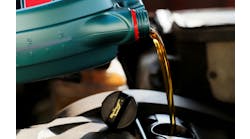Cummins Filtration's nanotechnology delivers cleaner fuel filtration
Cummins Filtration (www.cumminsfiltration.com) is using advanced nanotechnology in its fuel filtration products to provide an exceptionally high degree of fuel cleanliness that is capable of removing 99.5 percent of harmful fuel contaminants greater than 4 microns - particles smaller than red blood cells in the human body, typically 6-8 microns in width, say company officials.
Cummins Filtration, a wholly owned business unit of Cummins, is the world's leading designer and manufacturer of filtration and chemical technology products for all engine-powered equipment.
Modern diesel engines equipped with high pressure common rail fuel systems (HPCR) that operate at pressures exceeding 29,000 psi require an unprecedented degree of fuel cleanliness. However, there are no institutional safeguards in place in the diesel fuel supply distribution system to maintain fuel integrity when it leaves the refinery, and to ensure that fuel contamination does not occur during handling and transport.
As a result, the World Wide Fuel Charter (WWFC) has determined that a full 50 percent of the fuel dispensed at retail fuel pumps around the globe does not meet the necessary cleanliness of ISO standards recommended by ISO 18/16/13 (ISO 4406 Contamination Code).
Cummins Filtration's extensive research on the matter has determined that, while bulk fuel filtration is desirable to aid in helping to control fuel contamination levels, there is no substitute for effective on-engine fuel filtration, company officials say.
Engine fuel filters in the real world are subjected to forces that do not occur in static laboratory testing conditions, namely flow surge and vibration.
Flow surge occurs at engine startup and during increases in engine speed (acceleration), leading to a dramatic increase in fuel flow rate. Studies by Cummins Filtration show that injector pilot valve wear increases dramatically by the fuel flow surges that take place at engine startup if the fuel does not meet cleanliness standards.
Engine vibration can adversely affect fuel filtration performance as well by dislodging and releasing (re-entrainment) contaminants previously captured within the fuel filters back into the system. What's more, aside from the aforementioned re-entrainment, as vibration increases, it can lead to a decrease in fuel filtration efficiency.
The new nano-fiber fuel filtering material developed by Cummins Filtration through extensive real world field testing captures and removes harmful contaminants from the fuel system such as water, organic (wax and bitumen-like asphaltenes) and inorganic (dirt and engine wear metals) materials from the system - a full 99.5 percent of materials 4 microns and larger under the most challenging conditions to which a fuel filtration system is exposed, namely flow surge and vibration, note the officials.
By isolating these harmful contaminants and providing an exceptional degree of fuel cleanliness, this advanced nano-fiber fuel filtering material provides maximum protection to a vehicle's high pressure common rail fuel system (HPCR) and other vital engine parts associated with the combustion process - minimizing vehicle downtime as well as costly engine repairs, they add.



